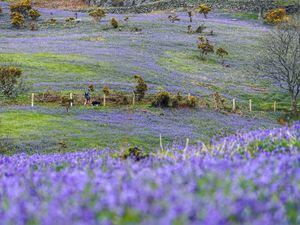Government efforts to protect nature are not enough to halt wildlife losses: MPs
Plans by ministers to improve the natural environment do not deliver the changes to bend the curve of biodiversity loss, committee says.

Government moves to stem nature losses “lack teeth” and are not enough to reverse declines in wildlife in the UK, MPs have warned.
The Environmental Audit Committee said plans by ministers to improve the natural environment within a generation and halt declines in species were a welcome start.
But they will not deliver the “transformative change required to bend the curve of biodiversity loss” in their current form, the parliamentary committee said in a new report.
It calls for the ban on peat products to be brought forward, better management of marine protected areas, reform of subsidies that harm nature to redirect money to conservation, and investment in skills and training for ecologists.
The MPs say they back the new natural history GCSE, and call for nature visits, teaching outside and getting children involved in the Government’s tree-planting drive to help youngsters value nature.

The report also calls for a series of legally binding targets to reverse declines in nature, a strategy setting out how environmental and planning policies will link together to form a coherent approach, and for the Government to detail how it will go beyond GDP and take into account the value of nature.
There should be “net zero” stress tests on the 2021 Budget to make sure it is in line with climate goals and nature tests should also be developed to ensure spending packages line up with biodiversity goals, it urged.
The MPs also warned there had been a cut in real terms public spending on measures to promote nature in recent years, despite a boost to Government agency Natural England’s funding this year.
They called for the next spending review to provide Natural England with a “materially greater contribution” in annual funding, giving it the hundreds of millions of pounds a year the body needs to deliver for nature.
The committee warned that the world was witnessing a colossal decline in wildlife and habitats, and the UK was one of the most nature-depleted countries on Earth, with 15% of species threatened with extinction.
The Government published a 25-year environment plan in 2018 to improve the natural environment within a generation, more recently outlined a state of nature target to halt the decline in nature in England by 2030, and has plans for a raft of environmental policies, such as tree planting and protecting peat.
But the MPs said that for the state of nature target to be the nature equivalent of the UK’s long term “net zero” emissions target – as it has been billed – there must be legally-binding interim targets, and it should include goals on species distribution, extinction risk, and the condition and extent of habitat.
And the 25-year environment plan must have interim targets to assess progress, they said.

Environmental Audit Committee chairman Philip Dunne said: “The UK is home to many millions of species, but Government inaction to protect habitats is leading to a significant decline in wildlife.
“Although there are countless Government policies and targets to ‘leave the environment in a better state than we found it’, too often they are grandiose statements lacking teeth and devoid of effective delivery mechanisms.
“We have no doubt that the ambition is there, but a poorly-mixed cocktail of ambitious targets, superficial strategies, funding cuts and lack of expertise is making any tangible progress incredibly challenging.”
He called for all Government departments to consistently factor nature into policy decisions.
But he added that responsibility for nature also rested with each and every citizen, so work to embed it into the natural curriculum and inspire future ecologists was absolutely crucial.

Environment Secretary George Eustice said: “As we build back greener from the pandemic, we are determined to maintain our status as a world leader in protecting the natural environment and to leave the environment in a better state than we found it.
“Our Environment Bill will deliver the most ambitious environmental programme of any country on earth and drive forward action to protect nature and improve biodiversity, including through a target for species abundance for 2030, aiming to halt the decline of nature.
“This is alongside our guaranteed £640 million investment in the Nature for Climate Fund for woodland creation and peat restoration, plans to treble tree planting before the end of this parliament, and increased protections for England’s waters through pilots of Highly Protected Marine Areas.
“We will respond formally to the Environmental Audit Committee’s review in due course.”





